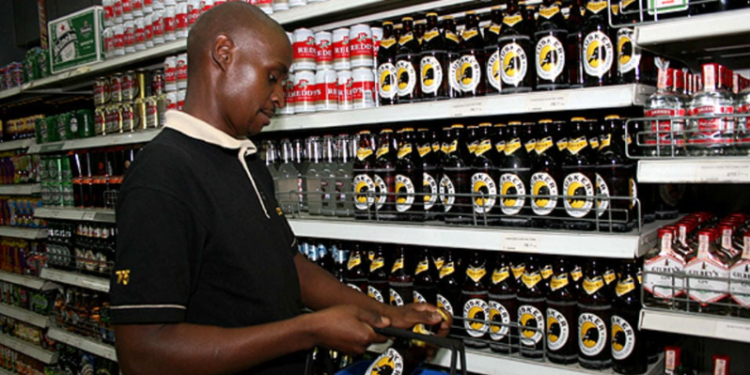The National Authority for the Campaign Against Alcohol and Drug Abuse (NACADA) has banned the sale of alcohol in ten categories of locations, including supermarkets.
In a report released on Wednesday, July 30, NACADA said the move is aimed at preventing, reducing, and controlling access to and availability of alcohol, drugs and substances of abuse.
The authority announced the immediate prohibition of alcohol sales through online platforms, home deliveries, and couriers.
Supermarkets, petrol stations, restaurants, residential premises and areas and outlets selling products associated with children —such as toy shops—are also affected by the new restrictions.
The authority further banned alcohol sales in vending machines, public places such as beaches, parks, amusement and recreational facilities, medical and sports facilities, as well as transport-related areas including bus parks, bus stops, railway stations, ferries, piers, and along highways.
Additionally, hawking of alcohol has been outlawed, while the sale of alcohol in basic education institutions, tertiary colleges, and universities will not be permitted.
Further, NACADA outlawed the sale and consumption of alcohol at any event oriented toward children, including festivals, parties, sporting, and recreational events. The sale of alcohol to individuals accompanied by children is also prohibited.
NACADA Lists Places Where Sale of Alcohol is Banned
-
Vending machines
-
Public beaches, public parks, amusement parks, recreational facilities, medical facilities, sports facilities, bus parks, bus stops, petrol stations, railway stations, public transport including trains, ferry stations, piers, and along highways
-
Hawking
-
Online sale of alcohol
-
Home deliveries and couriers
-
Supermarkets
-
Outlets selling products associated with children, such as toy shops
-
Residential premises and areas
-
Restaurants
-
Basic education, tertiary, and higher learning institutions
Areas Where Alcohol Consumption Is Prohibited
Furthermore, consumption of alcohol has been outlawed in various public places, including beaches, parks, amusement and recreational facilities, medical and sports centres, bus parks, bus stops, petrol stations, railway stations, ferry stations, piers, and along highways.
Restaurants and dining areas in members’ clubs and hotels have also been included in the list of prohibited consumption zones. The directive extends to all basic education, tertiary, and higher learning institutions.
Consumption of alcohol in outlets by or to individuals armed with offensive weapons is now illegal, and no one under the age of 21 will be allowed to enter alcohol-selling premises, even if accompanied by an adult.
Also Read: Minimum Legal Drinking Age Raised as New Rules Come Into Force
NACADA Issues Tough New Licensing Measures
At the same time, NACADA banned licensing of any retail or wholesale alcohol outlets located within 300 metres of any nursery, primary, secondary, or higher learning institution.
In a significant move to reduce availability, the number of alcohol outlets in any locality will be restricted based on population density and other factors.
Operating hours of retail alcohol outlets will also be regulated, and sales of alcohol in packaging smaller than 250ml will be banned.
Additionally, general retail alcohol licences (including those for wines and spirits shops, supermarkets, and franchise stores) will be prohibited.
Also Read: Alcohol Enemas: Risks and Effects of Consuming Alcohol Through the Rectum
The framework for on-license retail outlets will also be reviewed, focusing on the types of alcoholic drinks allowed for distribution and sale.
To curb conflicts of interest, public officers involved in enforcement or compliance at national and county levels will be barred from owning or operating alcohol outlets, whether directly or through proxies.
Counties are required to establish an institutional framework for licensing alcohol sales that includes local community involvement, a multi-agency approach, and full compliance with national standards—free from alcohol industry influence.
The authority emphasized the importance of responsible alcohol service training for staff in entertainment venues and retail outlets, saying this would help prevent abuse and ensure accountability in alcohol distribution.
Follow our WhatsApp Channel and X Account for real-time news updates.













































































